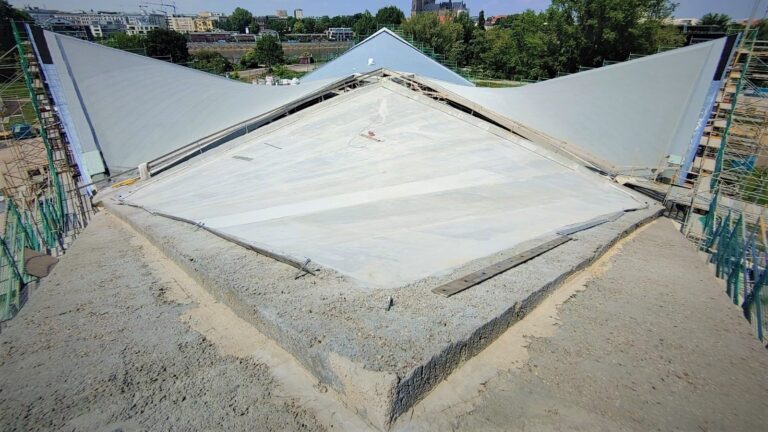
Walls by Finite Elements
SCN
PLTThe SCN application is used to calculate any kind of load-bearing walls (diaphragms) or wall-type girders in accordance with the finite elements method FEM.
The powerful graphical user interface provides numerous functions for the fast and efficient processing of this complex calculation model.
Any system with straight and curved edges including block-outs can be modelled. Reinforced concrete walls typical in massive building construction are mapped as diaphragms with all structurally relevant loads.
Discover more products from the FRILO portfolio now!
SHOW MOREInput
Most data are entered interactively in the graphical user interface.
To support this, DXF slides can be read in and self-defined auxiliary structures or auxiliary grids can be used.
Thanks to a locally definable coordinate system and direction-oriented data entry, points/components can be defined easily and accurately via the graphical user interface or by entering numerical coordinates.
The Undo/Redo functionality allows work steps to be undone/restored, which supports a safe and effective workflow.
Various import options top off the data entry.
Structural system
The load-bearing behaviour of the wall (diaphragm) is influenced by:
- Globally adjustable basic parameters such as
- Relevant standards
- Concrete qualities and steel grades
- Durability specifications to define concrete properties, exposure classes, permissible crack widths and permissible limit diameters
- Reinforcement layer for the definition of the centre of gravity of the front and rear reinforcement layer
- Area definitions such as
- Reinforcement areas for the definition of a basic reinforcement and to specify rotated directions of the reinforcement
- Thickness areas to describe partial wall areas with different thicknesses
- Line-type and point-type supports
- Supports for the definition of support springs, whose stiffness can be customised by the user
Loads
Loads are defined in various load cases, to which always a unique action group is assigned. All loads in a load case are assumed to apply always simultaneously. By assigning individual loads to an alternative group, these loads can be defined as to exclude each other.
All possible combinations are automatically considered in the calculation. The user can exclude particular load cases from the superposition.
Load types:
The available loads are point loads and line loads. For line loads, a distinction can be made between constant and non-constant loading.
Support conditions
Point loads or line loads. Point or line supports can also be created interactively via the corresponding components directly on the graphical user interface.
Mesh properties
The automatic mesh generator allows the generation of meshes with square elements.
The user can freely define the design points that should be calculated. When defining the design points, the element size can be specified.
By entering constraint geometries, the user can further influence the mesh generation.
Freely definable lines, points and circles are available for this purpose.
FE analysis
Square iso-parametric displacement elements are used for the calculation of the wall. These elements provide for the efficient and sufficiently accurate calculation of the internal forces acting on walls typical in building construction.
Bending design of reinforced concrete
The design of the reinforcement is performed in accordance with the Baumann method. A cracked slab element is used as a model. The design approach assumes an orthogonal mesh reinforcement. The reinforcement direction can be defined as desired. In this design calculation, the user can select whether the required compression reinforcement should be determined when the permissible compressive stress is exceeded.
Utilization of concrete
The utilization of the concrete compressive stress is determined and, if necessary, the required compressive reinforcement.
Structural safety
- Tension force design of the wall
- Determination of the concrete utilization
Serviceability
The existing crack width or the permissible limit diameter of the longitudinal reinforcement is calculated depending on the reinforcement ratio of the tensile reinforcement.
General
In addition to an extensive graphic and tabular output to create structural calculation documents in A4 format, all graphics can also be put out in the so-called drawing format. For the drawings, various title block templates can be defined and used subsequently.
Output
The output profile offers a variety of setting options to create an individual structural analysis document. The scale is freely selectable.
Import options
- Walls defined in the GEO Building Model can be imported with all loads and geometric details
- Data can also be imported into the SCN program from various CAD programs
- Via a direct interface to GLASER -isb cad-, CAD data can be read in and further processed on this basis
- Also, data from Allplan can be imported if the structural components have been processed appropriately in Allplan
- Via a DXF interface, geometry data in the form of auxiliary constructions can be imported from all common CAD programs. These data can be used in the program via a snap function supporting the easy entry of the geometry
Export options
- Graphical representations and results can be exported to a DXF file
- Reinforcement data are transferred in an open data format called ASF. How these data can be used in the target system depends on the functions available there. The ASF format allows the transfer of all data produced in the FE analysis. With this data, all results can be visualised in the ALLPLAN CAD system and used interactively in the creation of the reinforcement design
- A special interface has also been set up for the GLASER -isb cad- software, which can be used to generate the reinforcement
Reinforced concrete
- DIN EN 1992, DIN 1045 / DIN 1045-1
- ÖNORM EN 1992, ÖNORM B 4700
- UNI EN / NTC 1992
- BS EN 1992
- PN EN 1992
News

“With the FRILO Suite, we benefit from the use of all programs”
With the switch to the FRILO Suite, the engineering office concon has decided to rely on the FRILO subscription model. The reasons of the long-standing customer are manifold.

FRILO & CARBOrefit® | The calculation with carbon concrete pays off
With CARBOrefit® an process that enables renovation and reinforcement with carbon concrete has been integrated into the FRILO Software.





